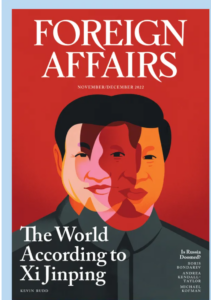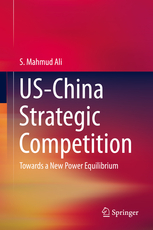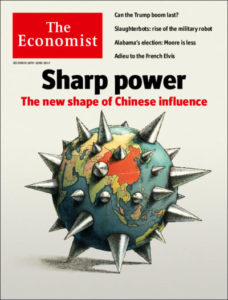China has ordered closer adherence to the dictates of the ruling Communist Party and leader Xi Jinping in legal education, demanding that schools “oppose and resist Western erroneous views” such as constitutional government, separation of powers, and judicial independence, AP reports:
The order was dated Sunday, a week before China’s ceremonial parliament begins its annual session and reinforces the leading role on ideology assumed by Xi, who is named no less than 25 times in the document. ….In a section titled ”Adhere to the Correct Political Direction,” the directive says teachers and students must “comprehensively implement the party’s education policy, insist on educating people for the party and the country, and focus on cultivating builders and successors of the cause of socialist rule of law.”
 “Oppose and resist Western erroneous views such as ‘constitutional government,’ ‘separation of three powers,’ and ‘independence of the judiciary,’ it says.
“Oppose and resist Western erroneous views such as ‘constitutional government,’ ‘separation of three powers,’ and ‘independence of the judiciary,’ it says.
Tongtong Zhang tells the Stanford Internet Observatory that autocrats strategically provide helpful, substantive responses to regime conformists in order to incentivize political conformity among the public (above). Officials engage in selective responsiveness primarily to send a signal to petitioners and potential petitioners that compliance, not organized opposition, opens doors for satisfying demands. Her findings suggest the need to re-conceptualize accountability under autocracy not only as a reactive approach to appease opposition, but also as a proactive strategy to cultivate conformity.
In a proposed global security framework unveiled last week, the Chinese government called for expanded training with security forces from other developing countries, a strategy that has alarmed the West, Axios reports. Critics worry that China’s deepening security cooperation with other countries could extend Beijing’s authoritarian reach into strategically important regions.
“[China] wants to promote itself as a new power with global power projection capabilities and international partnerships, particularly since it has a lot of catching up with the U.S., which has a network of alliances and military bases worldwide,” Vuk Vuksanovic, a senior researcher at the Belgrade Center for Security Policy in Serbia, told Axios.
 The newly created House Select Committee on the Strategic Competition Between the United States and the Chinese Communist Party launches its first hearing in prime time on Tuesday, NPR reports.
The newly created House Select Committee on the Strategic Competition Between the United States and the Chinese Communist Party launches its first hearing in prime time on Tuesday, NPR reports.
Raja Krishnamoorthi of Illinois, the ranking Democrat, said Democrats and Republicans had for years “underestimated” China, believing economic integration would “inevitably lead to democracy”. But it did not and now the US needed to move quickly to pursue policies that would “up our game”, The Guardian adds.
“We do not want a war with” the People’s Republic of China, he said. “Not a cold war, not a hot war. We don’t want a clash of civilizations.”
Former national security adviser H.R. McMaster and former deputy national security adviser Matt Pottinger are expected to testify. Both worked in Former President Donald Trump’s administration. Human rights activist Tong Yi and Scott Paul, the head of the Alliance for American Manufacturing are also scheduled to appear.
Latent weaponization
When China began to require Western corporations to establish Chinese Communist Party (CCP) cells, businesses brushed off the move as benign. But the CCP is a master practitioner of lawfare, or the purposeful use of law to achieve strategic objectives, notes analyst Jill Goldenziel.
In a recent legal salvo, the CCP launched several reforms to increase Party influence in the corporate world. In January 2020, a CCP regulation required all Chinese state-owned enterprises (SOEs) to amend their corporate charters to include the Party in their governance structure. In September 2020, the General Office of the Central Committee of the CCP released a report  asking China’s United Front Work Departments to spread Party ideology and influence in the private sector, including integrating Party leadership into all aspects of corporate governance, she writes for Forbes:
asking China’s United Front Work Departments to spread Party ideology and influence in the private sector, including integrating Party leadership into all aspects of corporate governance, she writes for Forbes:
More broadly, the establishment of CCP cells might be another manifestation of China’s strategy of what I call “latent weaponization.” China repeatedly represents political, economic, and geopolitical actions has benign while building or accreting them into tools that can be powerfully leveraged against adversaries. China cost the NBA hundreds of millions of dollars in 2020 after the Houston Rockets’ General Manager tweeted his support for protesters in Hong Kong. When the shareholders of a financial firm raise concerns about China’s human rights abuses, the firm’s clients might be at risk from China’s retaliation or rebuke.
It remains to be seen when a company may be forced to answer to the Party first and its shareholders second, she suggests.
Having gained some experience with influence tactics in places like Hong Kong, Taiwan, and Southeast Asian states, Beijing began to adopt these strategies more widely—particularly in New Zealand and Australia, says Council on Foreign Relations expert Josh Kurlantzick. New Zealand was, at first, one of the softest targets among liberal democracies. For more on how China has targeted New Zealand with its influence activities, he writes for Dominion Post.







